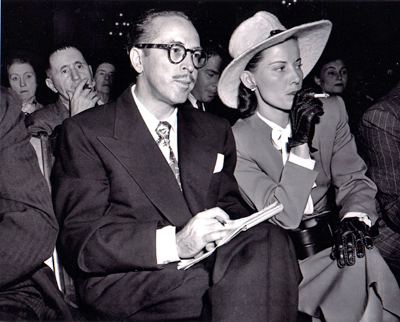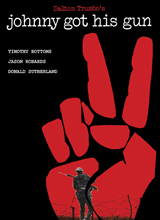
Dalton Trumbo and his wife Cleo at the 1947 HUAC hearings that resulted in his imprisonment
Dalton Trumbo was one of the heroes of the dreadful McCarthy era. A top Hollywood screenwriter, he was blacklisted as one of the "Hollywood Ten" - and imprisoned for his refusal to divulge his political beliefs to the self-styled "House Committee on Un-American Activities". He wrote under pseudonyms throughout the 1950s - winning two Academy Awards (for Roman Holiday and The Brave One) - that were given to the people "fronting" for him.
In 1960 he received official on-screen credit for his screenplays for Exodus and Spartacus and that led to the crumbling of the notorious blacklist. 
Starting this Thursday evening in Los Angeles, the American Cinematheque is presenting a three-night salute to Trumbo at Grauman's Egyptian Theatre in Hollywood. The first night presents the World Premiere of the digitally-restored version of the legendary 1971 film Johnny Got His Gun - based on Trumbo's classic 1939 anti-war novel. Trumbo became a first-time director at the age of 65 - at the height of the Vietnam war - in order to make this timely film. It starred Jason Robards, Donald Sutherland and Timothy Bottoms. It has been hailed as one the greatest anti-war films of all time.
Dalton Trumbo's son - Christopher Trumbo - is an acclaimed writer in his own right. He served as Associate Producer on Johnny Got His Gun.
To mark the occasion of the American Cinematheque tribute to his father - he has written this essay especially for Huffington Post.
***
War And Peace (A Sequel)
Once upon a time during the last century I was in Paris and it was the fourteenth of July, Bastille Day, the Fete Nationale, a party that France throws for itself to remember the day that the gates of the Bastille were forced open and the prisoners streamed out from that place of gloom and pain and death and into the sunlight and they were free.
Every year the French do this, and that night when I was in Paris I went to a party and Simone Signoret and Yves Montand were there and around midnight we all tumbled onto the streets and people were laughing and dancing and some of us got lost but later we made it back to the party and it went on until morning.
And after we got back James Jones - who wrote the book From Here to Eternity about men and women and soldiers and love and the way they live and what happens to them and the Second World War - began to talk with Dalton Trumbo - who wrote the book Johnny Got His Gun about all the things that Jones had written about except Trumbo was writing about the First World War which had been fought so the Second World War wouldn't happen, about what was called the War to End All Wars. Neither man was sober and when they finished a drink another always appeared and their talk was punctuated with "You're full of shit, Dalton" and "You're full of shit, Jim" and later "You're so full of shit, Dalton" and "You're so full of shit, Jim" as I remember it.
They were talking about what a person could do that would change things and, maybe because it was Bastille Day, Jones was glum about the progress of freedom and the prospect of peace in the world and that night he didn't think that one man could make a difference in the way things were going. Another night I think he would have argued differently but that night such was his take on the world, because it's so damned hard to stand up to unjust authority again and again and never see anything happen except maybe see things get worse. Trumbo didn't agree with him. He thought that one man could make a difference and he and Jones went round and round with neither one convincing the other.
Trumbo was blacklisted in Hollywood when James Jones and he talked that Bastille Day, and his name hadn't appeared on a film he'd written in almost 13 years because he refused to comply with the standards of political behavior Hollywood came up with in 1947, and his name wasn't on any films not because he'd stopped writing them but because his work appeared under the names of other men, or under pseudonyms, and among the films he wrote during that time were two that brought Oscars to writers who would not normally have received them because it was Trumbo who had written those scripts, not themselves.
Ring Lardner was later to say of Trumbo that: "With the possible exception of his astonishing antiwar novel Johnny Got His Gun, I'd rate Trumbo's almost single-handed assault on the blacklist as the major achievement of his career." But Trumbo wasn't able to break the blacklist, to smash it into pieces or obliterate it or crumple it up into a ball and throw it in the trash can - but he was able to cripple it, and when his name appeared on the screen when Spartacus and Exodus opened within a few months of each other in New York it became easier for other writers to get their names on what they had written without having to sign statements about what their political beliefs currently were or what they had been in the past or needing to justify themselves to their employers about anything at all.
Years later Trumbo would turn Johnny Got His Gun into a film as the best response he could manage to the carnage of the war in Viet Nam. He didn't believe that it would stop the war, just as it hadn't stopped the Second World War or the Korean War that followed so quickly on its heels and revived the starving military-industrial complex, but he had to do something, he had to add his voice to the voices of others who opposed the war, who said that too many millions have already died and it has to stop.
The war in Viet Nam ended and now everybody agrees that people speaking up against it had something to do with that, and those who favored the war and thought it should go on have yet to forgive them and they have studied those who opposed the war in Viet Nam and what they did, determined to learn what they could do the next time to stymie those kind of anti-war efforts, to make opposition to future wars ineffective.
Many soldiers wounded in our current War Against Terrorism - a war without borders or horizon, without territory to conquer and occupy and administrate although we will find territory and occupy and administrate something because that is how we will know the war has been won - are men and women who would not survive such wounds had they been received during the war in Viet Nam.
They get to hospitals sooner, get treatment sooner, and medical knowledge has advanced exponentially since that earlier war. Perhaps this is the war that will produce a real life Joe Bonham, Joe Bonham the fictional character Trumbo imagined in Johnny Got His Gun - armless, legless, face scraped out by shrapnel who cannot speak or taste or see or smell or hear or eat, yet he still lives and can think and feel, who is helpless and terrified and desperate and alone.
The triumph of Joe Bonham is that in spite of his condition he finds a way to communicate with the world and uses Morse code and relentlessly taps his head against his pillow and finally some one out there is able to figure out what he is doing and he is able to make himself understood. Regaining language he finds a way out of the trap his body has become and he bursts out of himself and into the world. And when the world outside asks him what he wants he tells them and they tap back to him that what he wants is "against regulations" and his frantic tapping cry of protest is met by a shot of morphine. But he keeps tapping - tapping tapping tapping until he is unconscious.
I don't know when this war our country is fighting in Iraq and Afghanistan and Pakistan will end. I don't know how to stop the endless slaughter and maiming and pain. But I know I must say it is wrong and that it must stop. I know that others are saying the same thing. I know that if enough of us are able to stand together we can make the difference between life and death. I don't know how that will happen, but I know it must.
I know that nothing can happen if I remain silent and that everything becomes possible when people find each other and take each other's hand. I know that when enough of us are able to put aside our fears and find courage in the name and power of our common humanity, that when we do that one by one and then another and another, again and again, every day and day after day that we will become a great and irresistible multitude and that this war will end.
So be it.